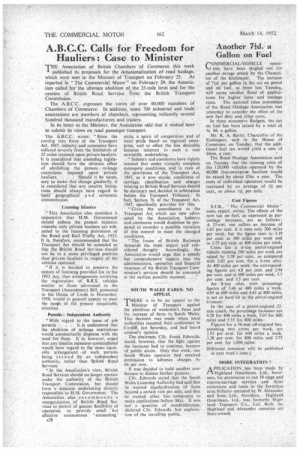A.B.C.C. Calls for Freedom for Hauliers : Case to Minister
Page 30

If you've noticed an error in this article please click here to report it so we can fix it.
THE Association of British Chambers of Commerce this week published its proposals for the denationalization of road haulage, which were sent to the Minister of Transport On February 25. As reported in "The Commercial Motor" on February 29, the Association called for the ultimate abolition of the 25.mi1e limit and for the cession of British Road Services from the British Transport Commission.
The A.B.C.C. expresses the views of over 60,000 members of Chambers of Commerce. In addition, some 700 industrial and trade associations are members of chambers, representing indirectly several hundred thousand manufacturers and traders.
In its letter to the Minister, the Association said that it wished later to submit its views on road passenger transport.
The A.B.C.C. wrote: "Since the coming into force of the Transport Act, 1947, industry and commerce have suffered severely from the limitation of 25 miles imposed upon private hauliers. It is considered that amending legislation should have the ultimate effect of abolishing the present mileage restrictions imposed upon private
hauliers. . . 'Should it be necessary to make this change gradually, it is considered that any interim limitations should always have regard to local geographical a n d economic circumstances.
.licensing I;justitre " This Association also considers it imperative that RM. Government should redress the present injustice whereby only private hauliers are subjected to the licensing provisions of the Road and Rail Traffic Act, 1933. It is, therefore, recommended that the Transport Act should be' amended so that the British Road Services should not be in a more privileged position than private hauliers in respect Of the vehicles operated.
"If it is decided to preserve the system of licensing provided for in:the. 1933 Act, then arrangements involving the iegistratioa of B.R.S. vehicles similar to those advocated in the Transport (Amendment) Bill, presented to the House of Lords in November, 1950, would in general appear to meet the nee0a of the present inequitable situation.
Permits: Independent Authority " With regard to the issue of job permits . it is understood that the abolition of mileage restrictions would automatically dispense with the need for these. It is, however, urged that any interim measures contemplated would have regard to the more equitable arrangement of such permits being issued by an independent authority, rather than British Road Services.
" In the Assoeiation's view, British Road Services should no longer operate under the authority of the British Transport Commission, but should form a separate undertaking directly responsible to H.M. Government. The Association also ,r ecommends a reorganization of British. Road Services to permit of greater flexibility of operation, to •provide stnall but effective autonomous 'accounting'
A28 units, a spirit of competition and of local pride based on regional enterprise, and to offset the less desirable features inherent in such a vast unwieldly undertaking, . Industry and commerce have rightly insisted that under virtually complete monopoly conditions, and in view of the provisions of the Transport Act, 1947, as it now stands, conditions of carriage, classification and charges relating to British Road Services should be statutory and decided in arbitration before the Transport Tribunal. In fact, Section 76 of the Transport Act, 1947; specifically provides for this.
"Given the amendments to the Transport Act which are now advocated by the Association, industry and commerce would doubtless be prepared to consider a possible variation of this control to meet the changed conditions. . .
"The future of British Railways demands the most urgent and considered thought. Accordingly, the Association would urge that a speedy but comprehensive inquiry into the administration, operation and financial structure of the British Transport Commission's services should be convened at the earliest possible moment. . . ."
SOUTH WALES FARES: NO APPEAL THERE is to be no appeal to the
Minister of Transport against the abolition of workmen's fares and the increase of faresin South Wales. This decision was made when local authorities resumed their conference in Cardiff, last Saturday, and had heard counsel's opinion.
The chairman, ClIr. Frank Edwards. stated, however, that the fight against the increases had to continue, because of public alarm. Only that week. one South Wales _operator had received permission to advance charges by 66 per cent.
It was decided to hold another conference to discuss further protests.
Cite Edwards stated that the South Wales Licensing Authority had said that he wanted standardization of fares beyond a certain rate per mile, and that he wanted other bus companies to make applications before May. It was not a question of standardization. declared Clio Edwards, but exploitation of the travelling public.




















































































